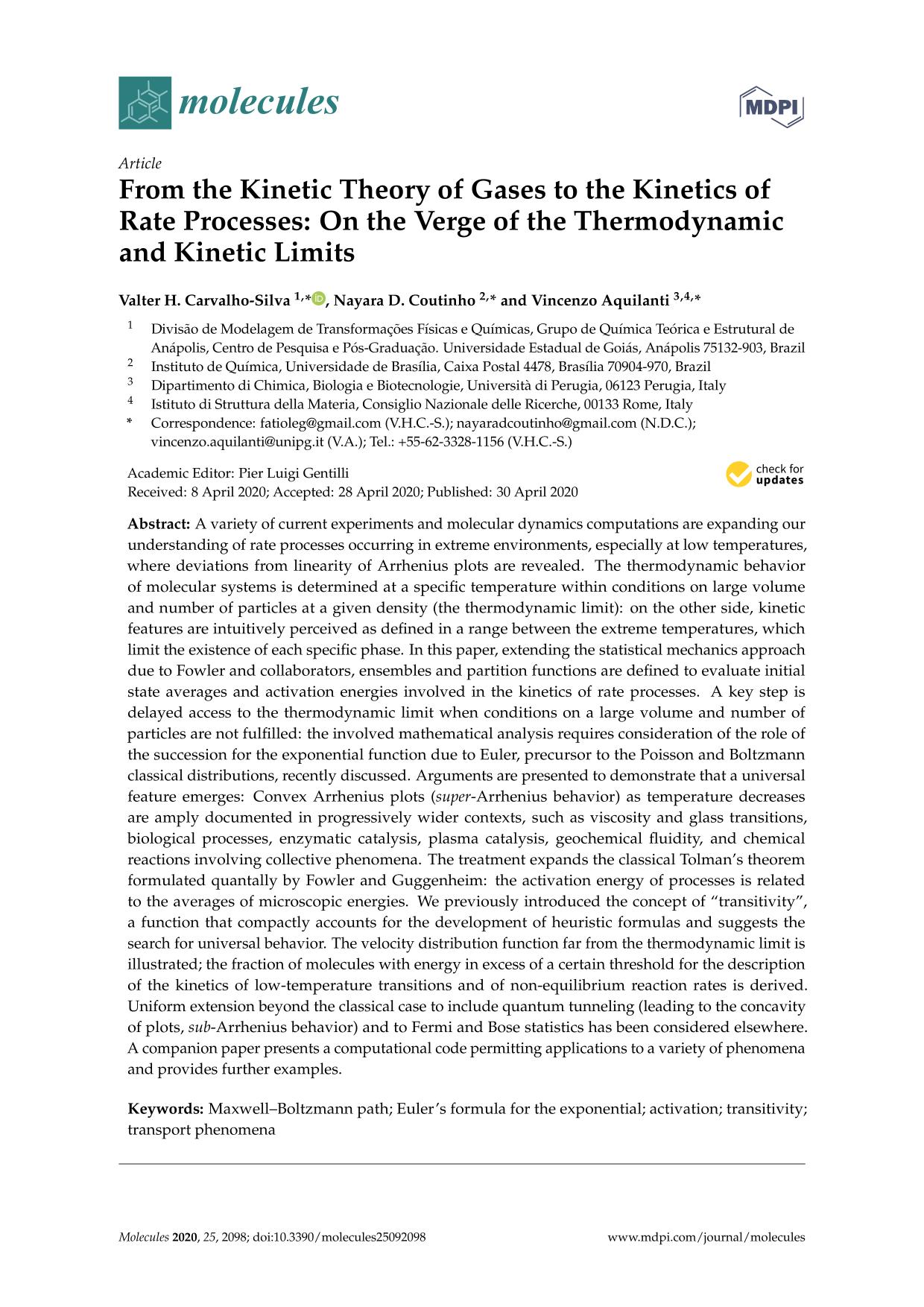Download [Article] From the Kinetic Theory of Gases to the Kinetics of Rate Processes: On the Verge of the Thermodynamic and Kinetic Limits PDF Free - Full Version
Download [Article] From the Kinetic Theory of Gases to the Kinetics of Rate Processes: On the Verge of the Thermodynamic and Kinetic Limits by Valter H. Carvalho-Silva, Nayara D. Coutinho, Vincenzo Aquilanti in PDF format completely FREE. No registration required, no payment needed. Get instant access to this valuable resource on PDFdrive.to!
About [Article] From the Kinetic Theory of Gases to the Kinetics of Rate Processes: On the Verge of the Thermodynamic and Kinetic Limits
<p><span>doi:10.3390/molecules25092098</span></p><p><span>Abstract: </span><span>A variety of current experiments and molecular dynamics computations are expanding our understanding of rate processes occurring in extreme environments, especially at low temperatures, where deviations from linearity of Arrhenius plots are revealed. The thermodynamic behavior of molecular systems is determined at a specific temperature within conditions on large volume and number of particles at a given density (the thermodynamic limit): on the other side, kinetic features are intuitively perceived as defined in a range between the extreme temperatures, which limit the existence of each specific phase. In this paper, extending the statistical mechanics approach due to Fowler and collaborators, ensembles and partition functions are defined to evaluate initial state averages and activation energies involved in the kinetics of rate processes. A key step is delayed access to the thermodynamic limit when conditions on a large volume and number of particles are not fulfilled: the involved mathematical analysis requires consideration of the role of the succession for the exponential function due to Euler, precursor to the Poisson and Boltzmann classical distributions, recently discussed. Arguments are presented to demonstrate that a universal feature emerges: Convex Arrhenius plots (</span><span>super</span><span>-Arrhenius behavior) as temperature decreases are amply documented in progressively wider contexts, such as viscosity and glass transitions, biological processes, enzymatic catalysis, plasma catalysis, geochemical fluidity, and chemical reactions involving collective phenomena. The treatment expands the classical Tolman’s theorem formulated quantally by Fowler and Guggenheim: the activation energy of processes is related to the averages of microscopic energies. We previously introduced the concept of “transitivity”, a function that compactly accounts for the development of heuristic formulas and suggests the search for universal behavior. The velocity distribution function far from the thermodynamic limit is illustrated; the fraction of molecules with energy in excess of a certain threshold for the description of the kinetics of low-temperature transitions and of non-equilibrium reaction rates is derived. Uniform extension beyond the classical case to include quantum tunneling (leading to the concavity of plots, </span><span>sub</span><span>-Arrhenius behavior) and to Fermi and Bose statistics has been considered elsewhere. A companion paper presents a computational code permitting applications to a variety of phenomena and provides further examples. </span></p> <p><span>Keywords: </span><span>Maxwell–Boltzmann path; Euler’s formula for the exponential; activation; transitivity; transport phenomena </span></p>
Detailed Information
| Author: | Valter H. Carvalho-Silva, Nayara D. Coutinho, Vincenzo Aquilanti |
|---|---|
| Publication Year: | 2020 |
| Language: | english |
| File Size: | 2.3153 |
| Format: | |
| Price: | FREE |
Safe & Secure Download - No registration required
Why Choose PDFdrive for Your Free [Article] From the Kinetic Theory of Gases to the Kinetics of Rate Processes: On the Verge of the Thermodynamic and Kinetic Limits Download?
- 100% Free: No hidden fees or subscriptions required for one book every day.
- No Registration: Immediate access is available without creating accounts for one book every day.
- Safe and Secure: Clean downloads without malware or viruses
- Multiple Formats: PDF, MOBI, Mpub,... optimized for all devices
- Educational Resource: Supporting knowledge sharing and learning
Frequently Asked Questions
Is it really free to download [Article] From the Kinetic Theory of Gases to the Kinetics of Rate Processes: On the Verge of the Thermodynamic and Kinetic Limits PDF?
Yes, on https://PDFdrive.to you can download [Article] From the Kinetic Theory of Gases to the Kinetics of Rate Processes: On the Verge of the Thermodynamic and Kinetic Limits by Valter H. Carvalho-Silva, Nayara D. Coutinho, Vincenzo Aquilanti completely free. We don't require any payment, subscription, or registration to access this PDF file. For 3 books every day.
How can I read [Article] From the Kinetic Theory of Gases to the Kinetics of Rate Processes: On the Verge of the Thermodynamic and Kinetic Limits on my mobile device?
After downloading [Article] From the Kinetic Theory of Gases to the Kinetics of Rate Processes: On the Verge of the Thermodynamic and Kinetic Limits PDF, you can open it with any PDF reader app on your phone or tablet. We recommend using Adobe Acrobat Reader, Apple Books, or Google Play Books for the best reading experience.
Is this the full version of [Article] From the Kinetic Theory of Gases to the Kinetics of Rate Processes: On the Verge of the Thermodynamic and Kinetic Limits?
Yes, this is the complete PDF version of [Article] From the Kinetic Theory of Gases to the Kinetics of Rate Processes: On the Verge of the Thermodynamic and Kinetic Limits by Valter H. Carvalho-Silva, Nayara D. Coutinho, Vincenzo Aquilanti. You will be able to read the entire content as in the printed version without missing any pages.
Is it legal to download [Article] From the Kinetic Theory of Gases to the Kinetics of Rate Processes: On the Verge of the Thermodynamic and Kinetic Limits PDF for free?
https://PDFdrive.to provides links to free educational resources available online. We do not store any files on our servers. Please be aware of copyright laws in your country before downloading.
The materials shared are intended for research, educational, and personal use in accordance with fair use principles.

